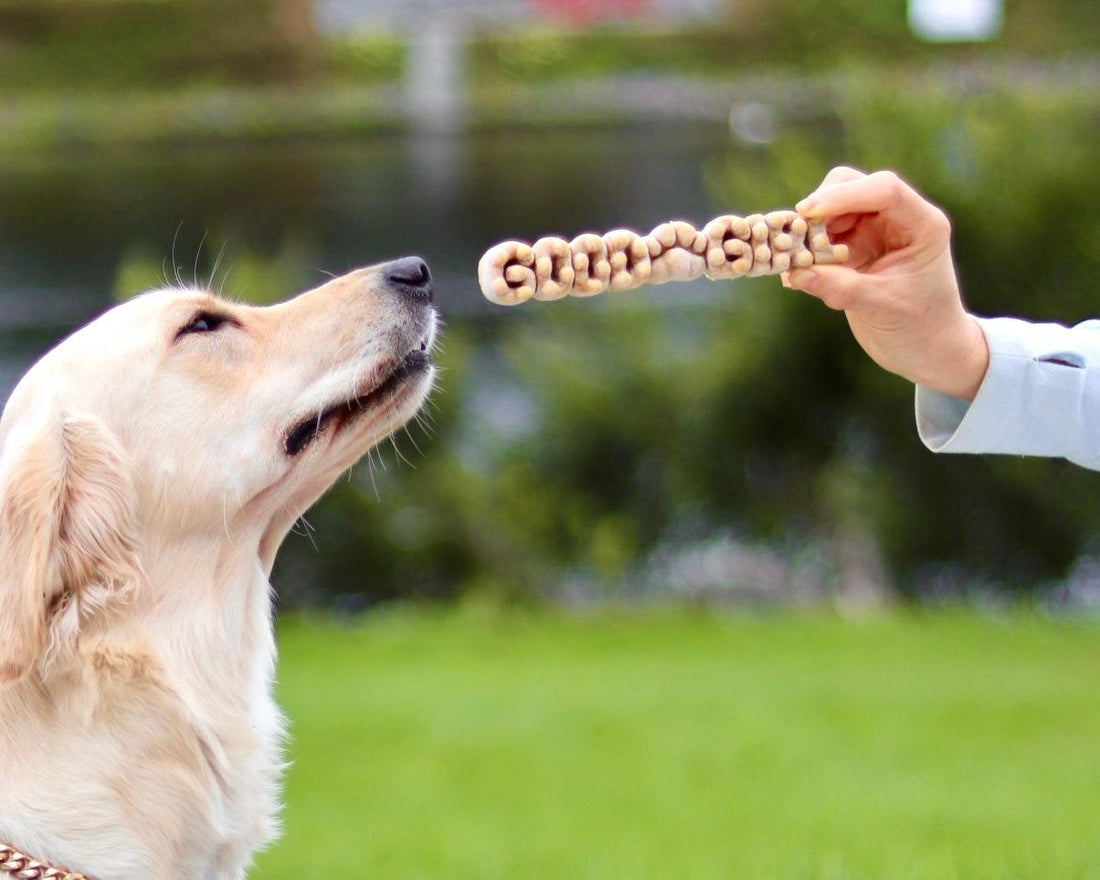
Your Dog’s Dental Sticks Do More Harm Than Good
Share
Check out what some pet health experts are sharing online about the hidden ingredients in store-bought dental sticks:
Bryce from The BK Pets, Certified Canine Nutritionist
Rachel Fusaro, Certified Canine Nutritionist
Rachel Fusaro is a certified professional canine nutritionist who works closely with veterinarians and dog health experts around the world. In the video below, she shares valuable insights into the potential downsides of certain commercial dental chews. This video critiques popular brands that include ingredients like wheat flour, glycerin, and other high-carbohydrate fillers. According to Fusaro, these ingredients are not biologically appropriate for dogs and can lead to the formation of plaque and tartar—ironically, the very issues dental chews are marketed to prevent.
Fusaro highlights that many of these chews contain synthetic ingredients, which could present digestive issues and even pose a choking hazard if consumed too quickly. She stresses that carbohydrates, which are prevalent in many of these products, can contribute to spikes in blood sugar and insulin levels, which is detrimental to long-term canine health. Fusaro advocates for a biologically appropriate diet that includes natural, low-carb ingredients and minimally processed chews that not only help scrape off plaque and tartar but also support overall metabolic health.
David Jackson, Canine Nutritionist
So, what’s really going on with the ingredients in these products, and how do they impact our dogs’ dental health?
What Science Says About Starches and Sugars in Dental Sticks
Dental health experts have known for a long time that starches and sugars play a significant role in the formation of plaque and tartar. Many of the popular commercial dental sticks contain ingredients like starches, which, when broken down, can feed oral bacteria and lead to plaque buildup. As Rachel Fusaro mentioned in the video above, this can actually contribute to the very problem these products are designed to solve.
A peer-reviewed study titled The Impact of Carbohydrate Quality on Dental Plaque pH found that starchy foods with high glycemic indexes (like certain breads and cereals) cause a significant decrease in dental plaque pH, leading to higher acid production and an increased risk of dental caries. When the pH in the mouth drops, it allows bacteria to thrive, resulting in more plaque formation.
While many dental sticks claim to clean your dog’s teeth, the presence of these starches and sugars could be promoting plaque rather than preventing it.
Why Switch to Homemade Dental Sticks?
At Pearly Bites, we believe in giving pet owners a healthier option by offering silicone molds for homemade dental sticks. Making your own dog dental sticks ensures that you control every ingredient—no fillers, no artificial flavors, and no sugars. This allows for a cleaner, fresher, more natural dental care solution for your pet.
Here are the key benefits of switching to homemade:
• Control the Ingredients: You decide exactly what goes into your dog’s dental sticks, ensuring a clean, healthy option.
• No Starches or Sugars: Avoid the harmful effects of starches and sugars that could be contributing to plaque buildup.
• Natural Alternatives: Use ingredients like bone broth or parsley, which are known to support dental health.
Rather than relying on heavily processed dental sticks, you can make your own dental treats with natural ingredients that not only clean your dog’s teeth but are also packed with nutrients.
Check out our infographic on great ingredients to add to homemade dental sticks:

By creating homemade dental sticks, you’re giving your dog a product that’s truly effective without the unwanted additives.
Is it Hard to Make Homemade Dental Sticks?
Many pet owners might wonder if creating homemade dental sticks is difficult or time-consuming, but the process is actually quite simple and rewarding. By following a few easy steps, you can craft your own natural, nutritious dental sticks at home using ingredients you trust.
Check out this quick guide on how to make homemade dental sticks using our silicone molds:

Not only is the process straightforward, but it also allows you to tailor the dental sticks to your dog’s specific needs, making it a healthier alternative to store-bought options. For best results, we recommend feeding one dental stick daily for medium to large breeds and two for giant breeds.

The Takeaway: Be Informed and Choose What’s Best for Your Dog
It’s important to note that not every dental stick on the market is harmful, and some might work well for certain dogs. However, based on the growing body of research and expert opinions, it’s worth taking a closer look at what ingredients are in the products you’re giving your pets. We encourage all pet owners to consult their veterinarians and explore homemade alternatives for better control over their dog’s dental health.
Disclaimer
The views shared in the embedded videos reflect the personal opinions of the creators and are not necessarily representative of Pearly Bites. We encourage all pet owners to consult with their veterinarian for personalized advice about their dog’s dental health.
